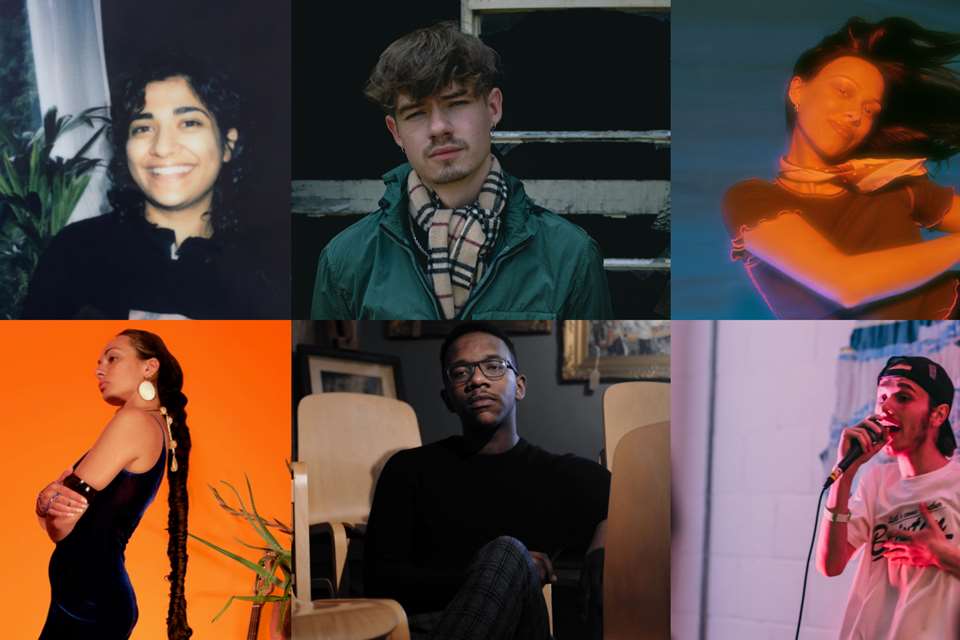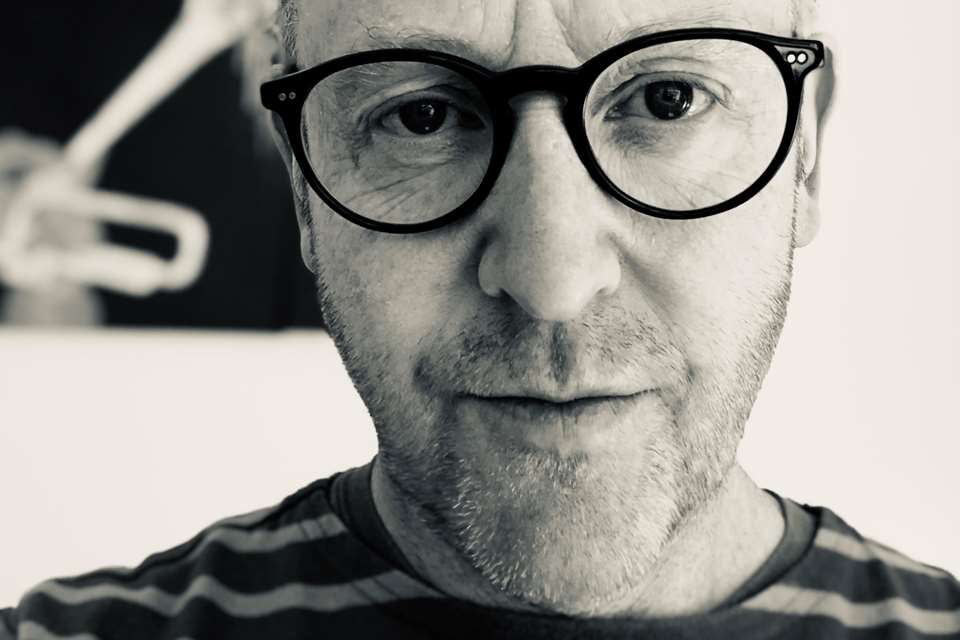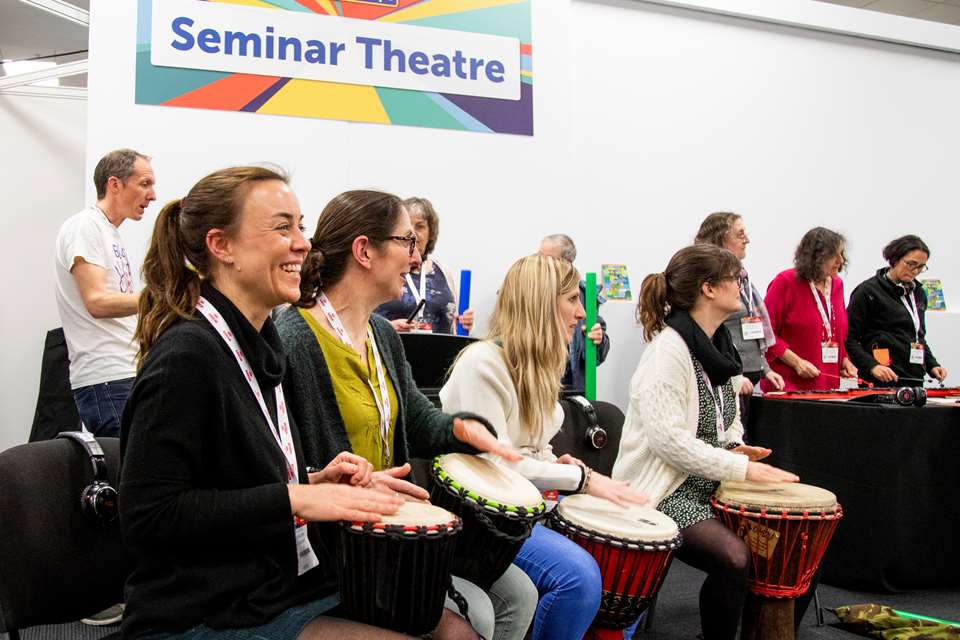Funding freedom: London Music Fund at 10
Harriet Clifford
Monday, November 1, 2021
In the London Music Fund's tenth anniversary year, Harriet Clifford speaks to chief executive Chrissy Kinsella and new, current, and graduate scholars Tanusha, Georgina, and Charles about the charity's impact on young people across the capital.
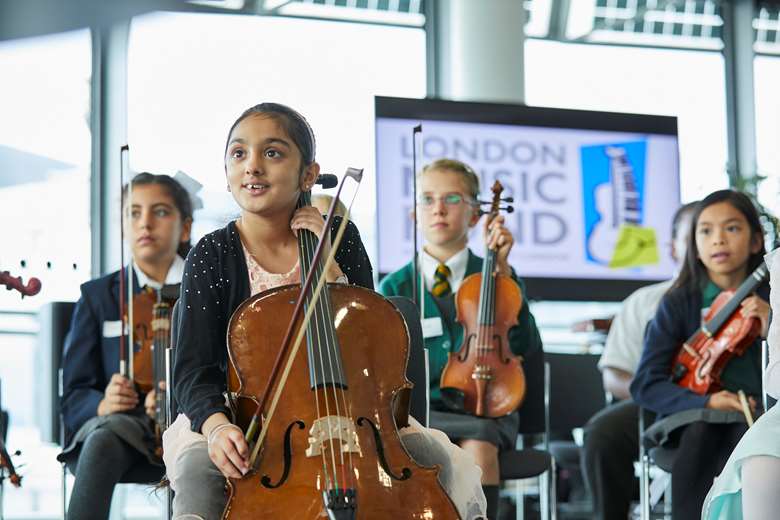
Courtesy LMF
'When I'm older, I'd like to play at the Albert Hall,’ says 11-year-old Tanusha, a new London Music Fund (LMF) scholar from Sutton. Although these scholarships are usually awarded to children in Year 5 at the latest, the disruption of the pandemic means that a double cohort has been accepted this year to ensure that no one misses out. ‘My teacher, Mrs Young, was my inspiration when I was five years old,’ continues Tanusha. ‘She played the flute in my primary school assembly and that night I dreamt of playing the flute. I nagged my mother until she hired a flute and organised lessons with Mrs Young.’ Despite initially being nervous, Tanusha soon got the hang of it, and after performing in front of the whole primary school last summer, her headteacher announced that she'd been awarded the LMF scholarship, meaning that she can continue with her tuition. ‘I think he announced it to inspire younger children to play outside of their comfort zones,’ adds the young flautist.
Celebrating its tenth anniversary this year, the London Music Fund is a charity dedicated to enabling children from low-income families to access high-quality music education. Since launching in 2011, the fund has invested over £3m in music education in London, including providing 600 four-year scholarships to young people living in all boroughs of the capital. One of two main programmes run by the LMF, the scholarship scheme allows children to continue learning a musical instrument in cases where the cost of ongoing tuition would usually be a barrier. Applications are submitted by London music hubs and to be put forward, children need to have been learning an instrument for at least a year, show potential and commitment, and attend a primary school in London where there are no fees. In recognition of its work, the Fund won the Outstanding Musical Initiative category at the 2021 Music & Drama Education Awards.
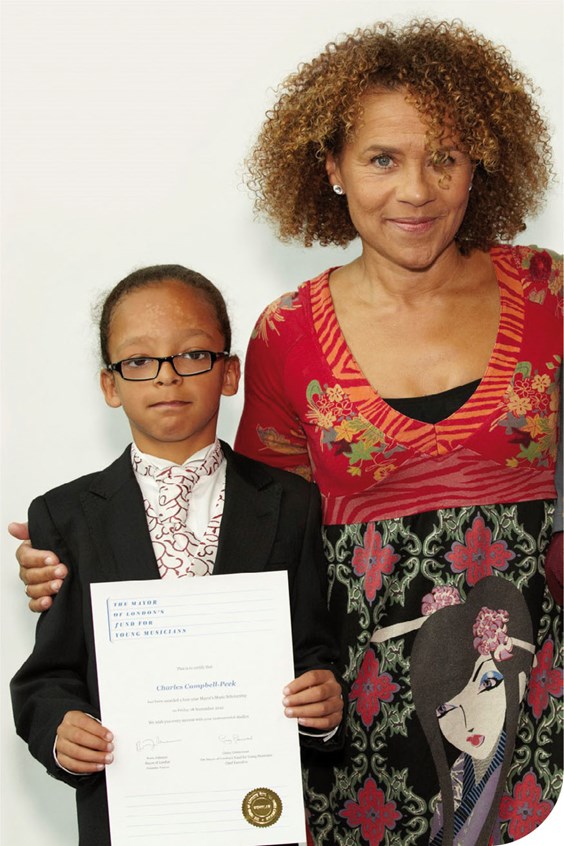
Charles and Chi-chi Nwanoku OBE at his LMF Awards Day in 2012 © COURTESY LMF
Chief executive since 2016 but at the LMF since 2012, Chrissy Kinsella gives me the charity's background: ‘Originally, the Fund was set up following a review of music education in 2009 undertaken by the GLA [Greater London Authority] – they identified that there were a number of gaps in provision. One was post-whole class instrumental teaching opportunities, particularly for children from low-income families, and the other was about cross-borough partnerships.’ The charity was then founded by Veronica Wadley, Baroness Fleet CBE, who is now chair, and Richard Morris, former CEO of ABRSM who remains a trustee. Wadley, who is also chair of the advisory panel for the refreshed National Plan for Music Education (NPME), on the Council of the Royal College of Music, and is governor of the Yehudi Menuhin School, plays a lead role in LMF's fundraising.
Taking the identified gaps as starting points (and following the introduction of music hubs after the 2011 NPME), the charity evolved into what it is today, providing scholarships to individual children alongside grants of up to £15k for hubs to support projects in their local areas and, most recently, working with small, grassroots community projects through Amplify London, the charity's partnership with YouTube Music. ‘What we've seen in the last 10 years,’ says Kinsella, ‘is that this quite simple concept is still relevant today.’ Since its inception, the Fund's patron has been the mayor of London, seeing both Boris Johnson and Sadiq Khan in the role.
Speaking to MT, current mayor of London, Khan, said: ‘I'm delighted to support the London Music Fund, which has had an enormous impact on music education in the capital over the last decade. As our city continues to recover from the pandemic, this work is more important than ever, providing access to culture and music for children from low-income families and underrepresented backgrounds. I look forward to seeing the charity developing even further in the coming years.’
Giving a chance
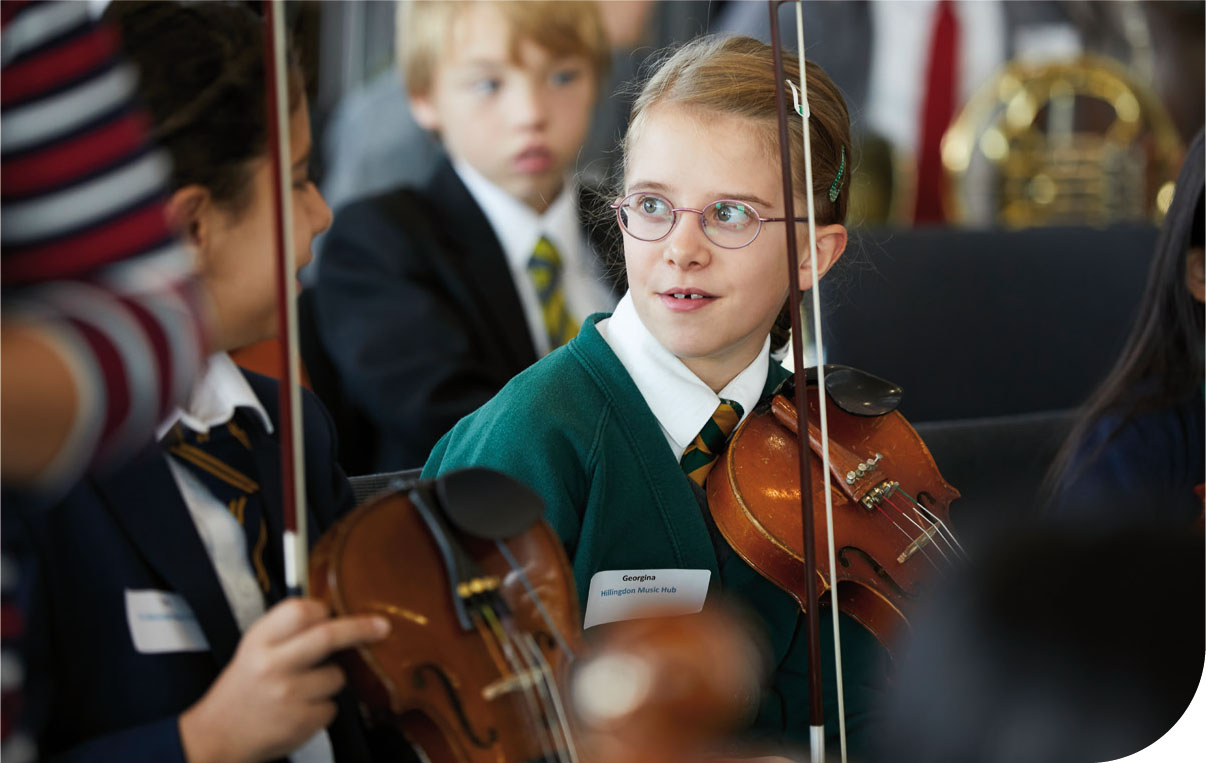 Georgina at her LMF Awards Day at City Hall in 2019 © COURTESY LMF
Georgina at her LMF Awards Day at City Hall in 2019 © COURTESY LMF
When children become scholars, they are provided with weekly instrumental tuition, a well-maintained instrument to take home, compulsory attendance at a weekly ensemble, regular performance opportunities, a mentor, and invitations to attend projects and trips. This month (October), the new cohort will be attending a LMF Playing Day led by the National Youth Jazz Orchestra at the Royal College of Music, just a stone's throw from the coveted Royal Albert Hall.
For current scholar Georgina (2019–23), these playing days and workshop opportunities are the best things about the programme: ‘You get to discover new music and instruments and meet new people, and you get to go to different places in London, which is fun. I got to discover the Benedetti Foundation, which is nice because I've always liked what Nicola Benedetti plays.’ Her excitement and passion for music overflowing, Georgina continues at a pace: ‘I actually got to go to a concert of hers, which was discounted, so that was very cool. I was sitting at the front, so I saw her, and afterwards I got to talk to her and she's really nice. Also, now I enjoy playing baroque music because it's beautiful and you get to play fast, which is fun.’
Georgina's energy is infectious, and I could spend all day listening to this 13-year-old talk about playing the violin. Prompted by her mother along the way, she tells me about her favourite music (baroque), her music theory lessons and choir, the time she saw a theorbo at the Handel House Museum (‘I do wonder how you fit it through doors’), and how her school initially wouldn't let her join the orchestra because she is autistic. Thankfully, her violin teacher, Jovana, persuaded the school to ‘give her a chance’, and she hasn't looked back.
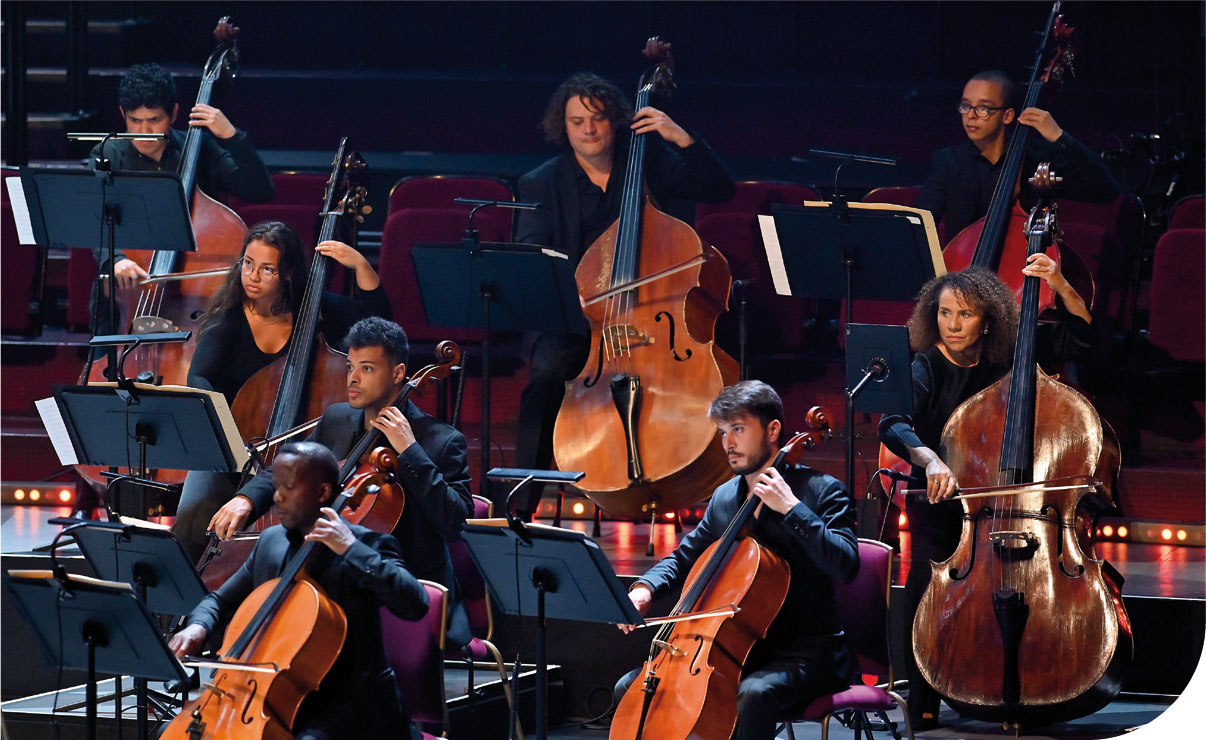 Charles playing at the 2021 BBC Proms, as part of the Chineke! Orchestra © BBC PROMS/MARK ALLAN
Charles playing at the 2021 BBC Proms, as part of the Chineke! Orchestra © BBC PROMS/MARK ALLAN
Wiping away tears, Georgina's mum explains: ‘It's changed her completely really. From the one who couldn't do PE and couldn't do orchestra, she became the girl in school who could play the violin – she was like the other kids. Also, she's a single child so it's a bit quiet at home, but now every Saturday she gets to go to orchestra.’ Jovana put Georgina forward for a scholarship, and her confidence, passion and talent have only blossomed from there. ‘She is just the most enthusiastic young violinist,’ says Kinsella, before I meet Georgina in person. ‘She always turns up with a huge smile on her face, and she throws herself into opportunities.’
Living in a small flat in Hillingdon makes it difficult for Georgina to practise at home, and her mum tells me how Georgina watches out of the window for her neighbours to go out. Unsurprisingly, the restrictions of her living situation were even more pronounced during lockdown: ‘It's been very difficult’, says her mum, ‘She's a good girl, my Georgie; she practises every day. But without a teacher it's not the same thing, and Jovana could see that and actually went to get a laptop for her.’ Even more so than any statistics, the raw emotion displayed by both mother and daughter during our interview is evidence of just how life-changing the LMF is for so many children and their families. Kinsella agrees: ‘It makes you realise how important this is for the emotional development of these children, and how they've struggled enormously during lockdown.’
Georgina and her mum make it absolutely clear that without the LMF, they wouldn't have had access to any of these opportunities, nor would they have even been aware of them. ‘Especially for us,’ says mum. ‘My husband is a bus driver and I'm a stay-at-home mum and do a bit of cleaning. It's not something we know anything about, so for her it's wonderful – it's opened a new world.’ As we're all saying goodbye, LMF's programmes manager hands Georgina a gift that's been sent by a donor who's heard about her living situation. It's a violin mute.
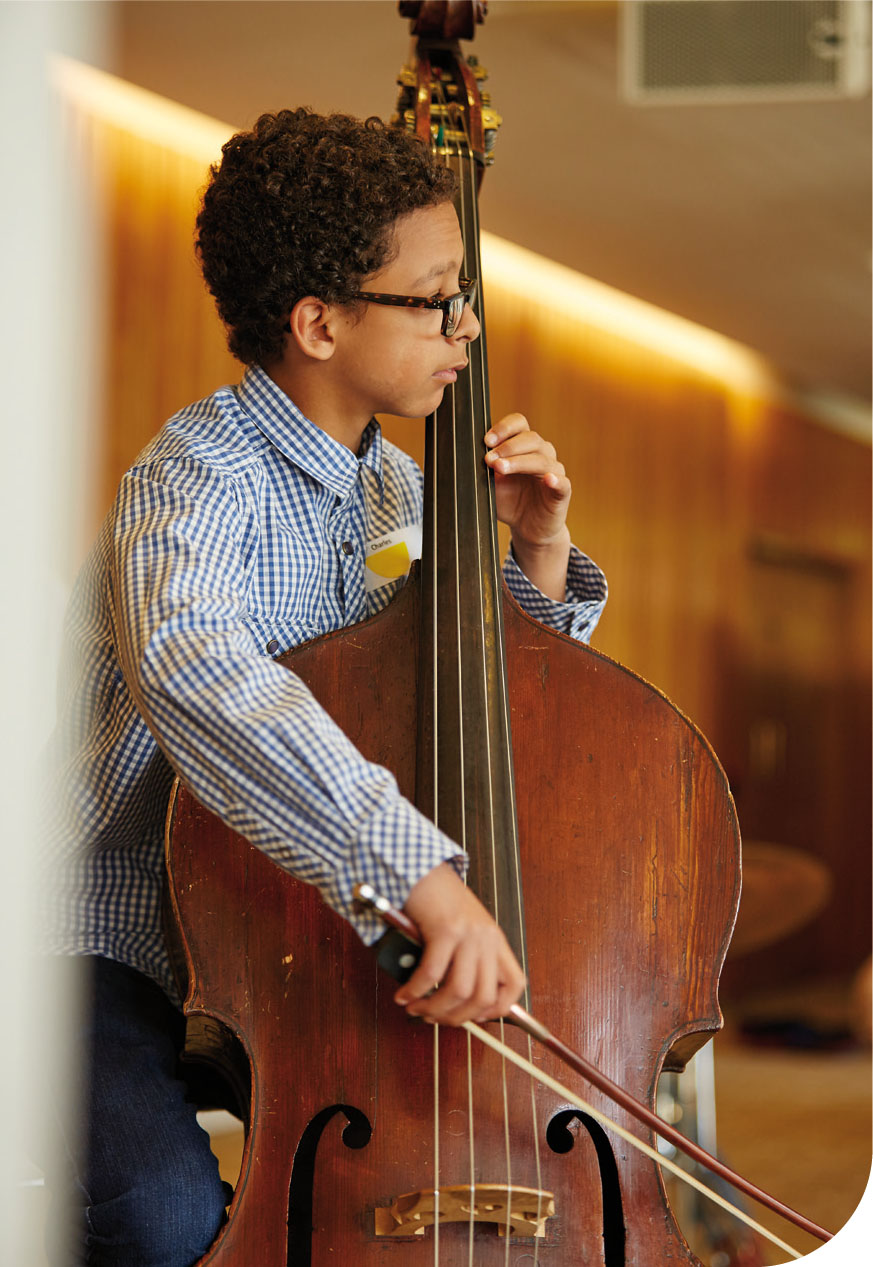
Charles at LMF's 2017 Playing Day at the Royal Festival Hall © COURTESY LMF
Backed-up vision
As though being the CEO of a successful independent charity is not enough, when we speak, Kinsella has just submitted her master's thesis. Using data collected during her day job, the research explored musical progress and progression in the context of the London Music Fund. ‘It was very interesting,’ she says. ‘We've come up with a clear list of things that have the most impact on whether or not children stay on the programme for the full four years, and how much progress they make over that period.’ Kinsella found that the factors that had the strongest impact were things like attendance at Playing Days (workshops run by the LMF with high profile professional musicians and LMF ambassadors at venues such as the Royal Academy of Music, the Southbank Centre and Guildhall's Milton Court), the percentage of parental reports that are submitted on time, and attendance at Saturday centre. ‘We could say that a number of the things at the top are down to family and parental support,’ says Kinsella, ‘So, what can we do as an organisation to support those children who don't have that family support, because perhaps English is an additional language, or they live in a very remote part of London?’ Something the team is thinking about is developing the mentor role, enabling families to have more intensive support from LMF.
The factors at the bottom of the list were things like socioeconomic status, ethnicity, age, and whether the child needs to borrow an instrument when they start. ‘What this tells us,’ continues Kinsella, ‘is that the programme is doing what it set out to do and it's working. If you get those children into a programme where they can have the tuition and they can have the funding over a long period of time, then actually those barriers don't exist anymore, and they can make just as much progress.’
Flying high
One young musician who completed the four years and really ran with it is graduate scholar Charles from Havering. Now aged 17, having begun his LMF journey at the age of eight, Charles achieved his Grade 8 on the double bass around five years ago. Just some of his performance credits include playing at the London 2012 Olympics Opening Ceremony, playing with Chineke! Juniors since its launch in 2015, and multiple appearances at the BBC Proms with the National Youth Orchestra of Great Britain (NYO) and Chineke!'s senior orchestra (as a junior). Meeting Charles, it's immediately clear that despite his impressive array of achievements, he is humble, unassuming, and incredibly grateful. Our interview was only a week or so after the Proms, and Charles tells me: ‘It was my second time at the Proms, so it was quite overwhelming. But it was a good experience, and it was nice to play in front of a live audience again.’
His father – and biggest fan – was in the audience at the Proms, and most of Charles’ other concerts. ‘It's been amazing,’ he says. ‘I've seen most of the country now, which I'd never seen before. At the time it's a bit of a pain because you're dragging that thing around – if it had been a piccolo, it would have been fine.’ We all laugh. ‘I just like seeing him anyway,’ continues Charles’ dad, ‘I'd watch him open up an envelope, I think he's fantastic’. Similar to Georgina's mum, Charles’ parents had little experience of classical music before their children got involved through school and, subsequently, the Fund. ‘I would never listen to classical music, not until he came along, so it's a whole new world for me,’ says dad. ‘And I'm not saying I like all of it, but some bits I really do like.’
Charles now attends boarding school on a music scholarship: ‘Because of the support with early tuition, I was able to have enough lessons to get me to a standard where I could then get scholarships at my senior school and at Junior Guildhall. Without the London Music Fund, I wouldn't have had the lessons to do that.’ I ask whether the Fund has changed his life. ‘Yep, 100 per cent’, he says, without skipping a beat. ‘I wouldn't have been able to afford near enough any tuition – I wouldn't have been able to meet Chi-chi, meet the people I have, had any of the opportunities or done any of the projects, if it wasn't for the London Music Fund.’ Double bassist, founder of Chineke! Foundation, and ambassador of the London Music Fund since 2011, Chi-chi Nwanoku OBE has taken Charles under her wing and has been at most of his projects and concerts over the years. He's also had the opportunity to play a duet with her.
We could spend all day chatting about the wonderful things Charles has had the opportunity to do thanks to the LMF, but the conversation quickly circles back to the very beginning. Charles initially went to Havering Music Service to learn the violin (‘He's achieved a good standard on that as well’, adds dad), but when he wanted to play the double bass, the family came up against a brick wall. ‘We were struggling. The cost was just escalating, and I couldn't afford it. Someone at Havering mentioned the London Music Fund, so they put it through for us and we were fortunate enough to get it,’ says Charles’ dad. He also explains how Thwaites musical instrument shop in Watford has sponsored Charles to hire a double bass since the very beginning. ‘We've been very lucky’, he adds.
Untapped potential
Whether or not ‘luck’ has anything to do with it, the London Music Fund can only offer places on the four-year scheme to around 60 children each year. Due to the simple fact that, currently, children in England are not routinely entitled to free instrumental tuition, thousands of children have to give up before they've really got going. Although whole class instrumental teaching gives them a taste, for many this is cruelly snatched away. ‘It's quite sad to think about,’ says Charles thoughtfully. ‘There's a lot of potential that would have been tapped into had they had the support. Not necessarily in music, but I know a few cases of people who could have achieved really big things, but they had no support and because of that, they haven't. I think it's a shame that people can't fulfil what they want to or what they could have.’
Speaking to Kinsella, I suggest that in an ideal world, the LMF wouldn't exist. ‘It's really interesting to think about,’ she says, ‘especially as we start to think about the new NPME. Every child deserves access to a well-rounded, progressive, sustained music education, and there are some fantastic programmes out there. But you're absolutely right – in an ideal world, I'd be so delighted if we didn't have to exist because every child would be getting that provision through their primary school, their secondary school, within curriculum music, and also having access to free music education like Saturday centres.’
She continues: ‘I think there is a huge amount that we can be very positive about in terms of the National Plan and the funding that hubs do get from the Arts Council and the Department for Education. But what I would love to see in the new Plan is more of a commitment to ensuring that there are proper affordable progression routes beyond whole class teaching. They need to be genuinely accessible for children from low-income families who currently couldn't possibly afford them and wouldn't know they exist. We need to join the dots between curriculum music, extra-curricular activity, hubs, music providers, and music education establishment, and make sure that there's a holistic path for a child to follow, particularly if a family wouldn't even know where to start.’
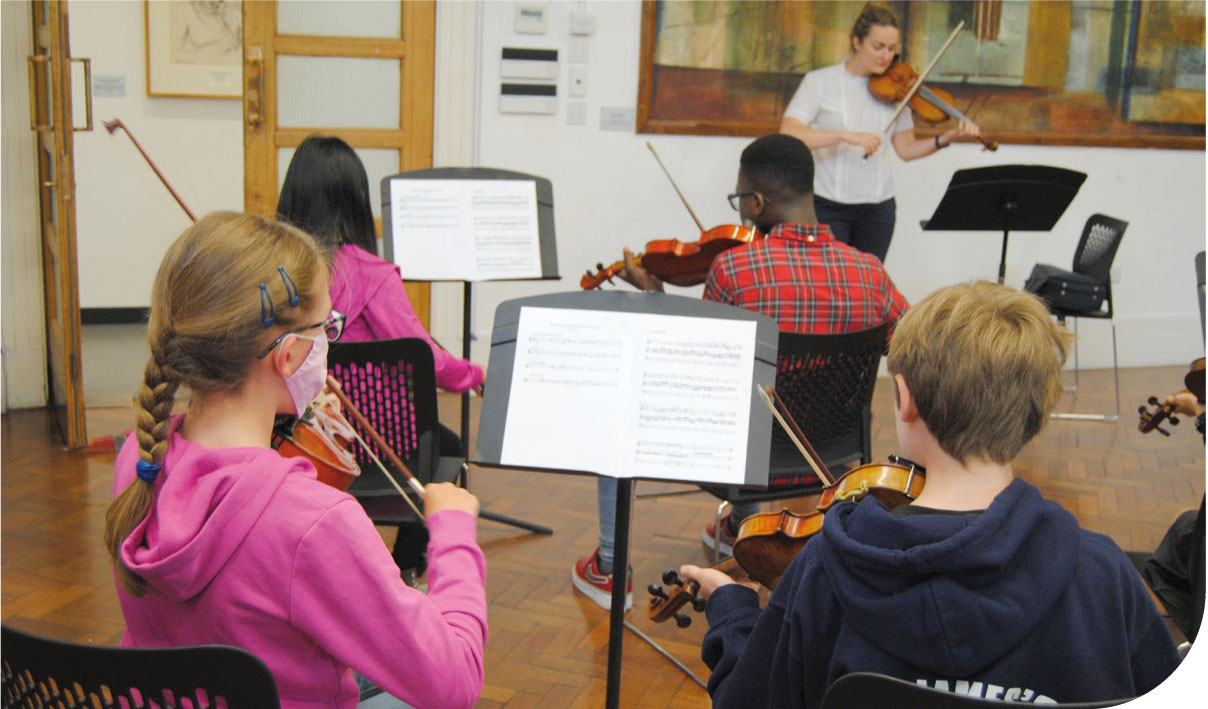 Georgina (on left) at LMF's Playing Day in spring 2021 at Morley College © COURTESY LMF
Georgina (on left) at LMF's Playing Day in spring 2021 at Morley College © COURTESY LMF
This is clearly Kinsella's bread and butter, and she goes on: ‘Starting with whole class teaching is the best access point we have. I'm sure there's a lot wrong with teaching 30 children at once in a class – I've never attempted it myself – but I think it works, to a point. Obviously, not every child wants to do music, and that's fine, we shouldn't force them to. But the children who want to, and who just show that spark, that commitment and potential, should have absolutely no barriers in their way to being able to access that level of music education.’
Looking ahead
Here's to hoping that in 10 years’ time, Tanusha will be playing at the Royal Albert Hall, music education will be available to every child, regardless of their background, and we won't be celebrating another decade of the LMF, at least in its current form. For now, though, we certainly can celebrate the life-changing work being carried out by charities like the LMF, organisations, hubs, schools, teachers, and individuals. As is evident from my conversations with Tanusha, Georgina, and Charles, the young people supported by the Fund are incredible, and this is only a snapshot from one charity in one city. Something Tanusha said to me perhaps summarises what we're all trying to do here: ‘I am motivated to build my confidence in playing the flute to the best of my abilities so my dream will come true.’ What right does anybody have to take that dream away?
The London Music Fund's current ambassadors are:
Nicola Benedetti CBE
Sir George Benjamin CBE
Julian Bliss
YolanDa Brown
Simon Cowell
Sir Mark Elder CH, CBE
Jools Holland OBE
Stephen Hough CBE
Steven Isserlis CBE
Miloš Karadaglić
Tasmin Little OBE
Julian Lloyd Webber
Wayne Marshall OBE
Rachel Portman OBE
Abel Selaocoe
Jess Gillam MBE
www.londonmusicfund.org
The LMF has launched a Friends’ Scheme to help the charity raise sustained, vital funding. By setting up regular donations, supporters will be enrolled on the scheme, and will also receive updates and invitations in return for their generosity. Find out more www.londonmusicfund.org/become-a-friend


